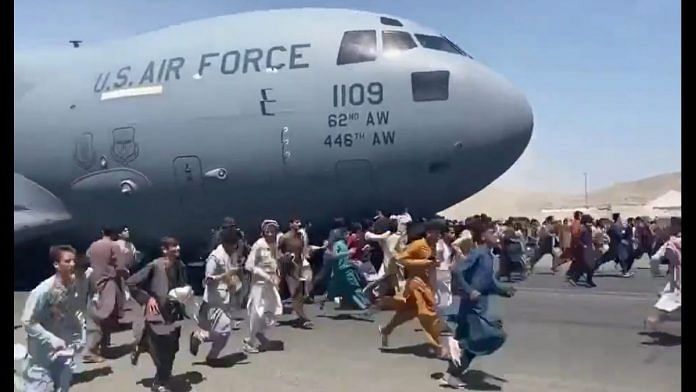The lightning speed of events in Kabul are making news bulletins irrelevant by the hour. Afghanistan’s Vice-President Amrullah Saleh has claimed he is the caretaker President. After the Taliban forces stormed into Kabul without any resistance from the Afghan National Army, following the hasty and indiscreet exit of the US forces, there is yet no clarity as to who is in the hot seat in Kabul. For the Taliban, the takeover of Kabul was a cakewalk but holding on to power and governance will be a tough challenge.
New Delhi has decided to wait and watch and keep a hawk’s eye on the emerging situation. One option for India is to go along with the friends and allies in the region and the world in general, before beginning to deal with the Taliban as a recognised government. But it is doubtful if the so-called democratic liberal Western world will ever learn to negotiate the arduous paths of truth and reality in Afghanistan and the implications of the American withdrawal.
Task cut out for MEA
India should be aware of the ground realities behind the ascendency of Taliban, especially after the Doha round of talks. To begin with, Taliban made it clear that New Delhi will have to ‘sever all links with the democratically elected government’ in Kabul before joining the peace talks in Doha. According to unconfirmed reports, the Ministry of External Affairs (MEA) could have established some links with the Taliban on the presumption that the Afghan militia will surely get hold of Kabul, once the US quits. The MEA’s calculations were right. The immediate task, therefore, is to ensure the safety of Indians in Afghanistan and evacuate as many of them as possible. It should not come as a surprise if Indian support is sought even by the Americans and others, considering the fact that none of these countries are in a position to extend logistic support to their stranded citizens.
The MEA will also have to initiate some immediate steps, like allowing Afghan citizens and students, presently in India, a longer stay if they request visa extension. Subsequently, when the situation in Kabul stabilises, the MEA should seriously consider increasing the Afghan student intake in Indian educational institutions. Unlike the Tibetan displaced persons, whose stay in India has extended for decades, the Afghan situation will surely improve for better. India will require a generation of Afghans to rebuild the country and establish peace there for the larger interest of the region. It is important for the MEA to assess the geopolitical implications of the US withdrawal and subsequent events in Kabul.
In the long run, the involvement of Pakistan and China, and the renewed interest of Russia in Afghan matters should be a cause of concern for India. The US has absolutely no qualms in turning a blind eye to the atrocities that China committed on its own citizens in Xinjiang, and in Tibet. Yet, ‘for a few dollars more’, the US positioned China as a lead power and Barack Obama’s ‘pivot to Asia’, Donald Trump’s ‘America first’ and Joe Biden’s strategy to balance between containment of and engagement with China is proving to be a perfect example of confused foreign policy of a global power with local aspirations. The abject failure of the US in the region, especially in our immediate neighbourhood, will have deep geopolitical impact.
The MEA should be aware of the deep-rooted innate contradictions in the Taliban. Besides the Pashtun and non-Pashtun factions, there are a number of other smaller groups that are fiercely passionate about their tribal identity and hold over their respective turf. When the contracts for mining of minerals and tapping natural resources starts, it will not be easy for the Talibani establishment in Kabul to merely play the role of a mediator and take its cut. For example, even the Afghan National Security Force (ANSF) found it difficult to exercise total unhindered control over Raghistan gold mine, which was under the control of Tajik fighters who had swelled the ranks of Taliban. With the ANSF practically gone, it is doubtful if this group will yield its control over the gold mines to the Kabul establishment. As it is the teething troubles have already begun for the Taliban with the US and the IMF chocking Afghanistan’s monetary assets.
Also read: I am the spiritual leader of Taliban. My boys will rule Afghanistan again after 20 years
The China challenge
As for China, it is too early to crown Beijing with a strategic victory in Afghanistan. The Taliban has no single Afghan identity and it is heavily dependent on various factions representing different regions, tribes and interests. The most important yet weak link of the Taliban is in the north where the East Turkistan Islamic Movement (ETIM) or the Turkistan Islamic Party is very strong and active. This Sunni Islamic fundamentalist movement aligned to Uyghur nationalism will extract its pound of flesh from the Taliban leadership by asking them to roll back controls in Xinjiang, and would like to do to the People’s Liberation Army of China what the Taliban did to the ANSF.
During his visit to China, Taliban’s apex leader Mullah Abdul Ghani Baradar was asked to put down the rebellion of the ETIM, which Chinese foreign minister Wang Yi identified as “posing a direct threat to China’s national security”. It is not going to be easy for the Taliban to antagonise the ETIM in areas that were once the stronghold of the Northern Alliance. It would, therefore, be interesting to see China struggling to balance between the devil and (quite literally) the deep blue sea.
Seshadri Chari is the former editor of ‘Organiser’. Views are personal.
(Edited by Anurag Chaubey)



